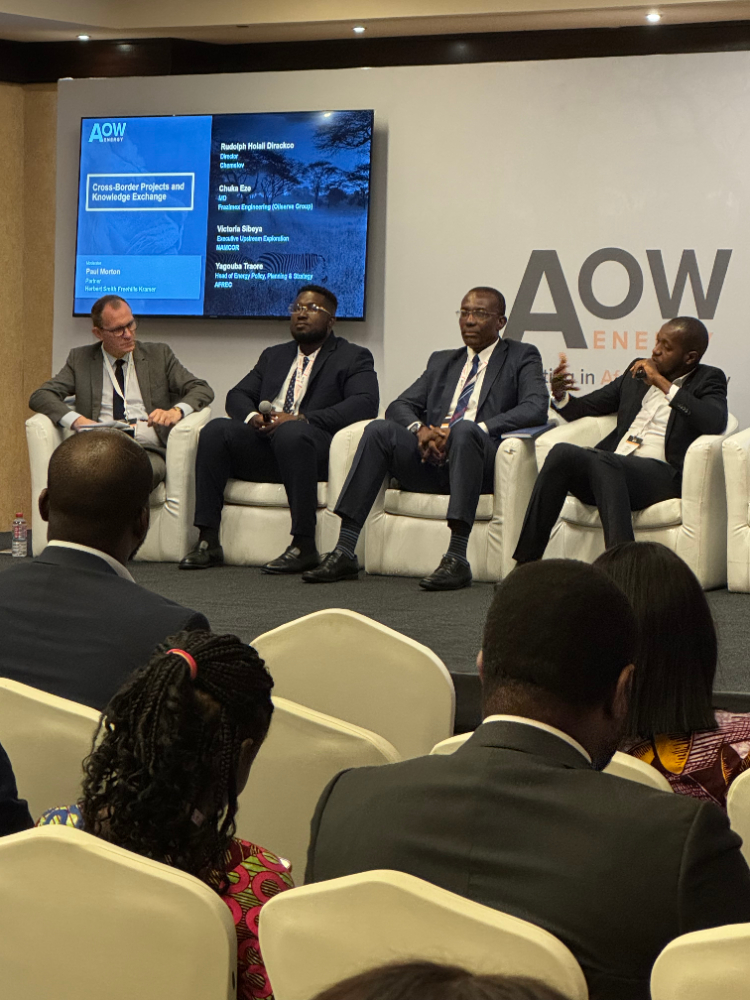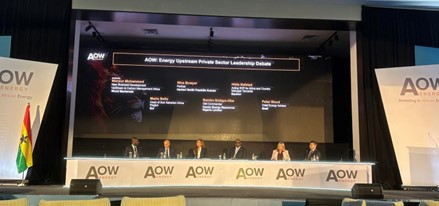- within Energy and Natural Resources topic(s)
- in European Union
- in European Union
- within Energy and Natural Resources, Transport, Media, Telecoms, IT and Entertainment topic(s)
- with Inhouse Counsel
- with readers working within the Law Firm industries
AOW Energy 2025, held in Accra, Ghana from 15-19 September 2025, brought together governments, regulators, operators and financiers to discuss the future of Africa's energy sector. With Ghana hosting for the first time, the event highlighted the country's upstream resurgence and broader continental efforts to foster regional collaboration, unlock capital, and modernise regulatory frameworks.
As a firm deeply embedded in Africa's energy landscape, HSF Kramer was proud to contribute to the dialogue, with Partners Paul Morton and Nina Bowyer moderating or participating in key sessions focused on upstream finance, regional collaboration, and private sector investment in upstream assets. Their participation reflected our commitment to supporting clients as they pursue their projects and transactions across Africa.
Several themes emerged from AOW Energy:
Ghana's Energy Push: A Sector Reignited
Ghana used its role as host to reaffirm its commitment to revitalising the upstream sector. The event began with the announcement of ENI, Vitol, and the Ghana National Petroleum Corporation (GNPC) signing a USD $1.5 billion Memorandum of Intent with the Government of Ghana to expand production capacity and develop the Eban-Akoma field in Cape Three Points Block 4. The agreement outlines an integrated investment plan, aimed at contributing to national goals for reliable, affordable, and low-impact access to energy.
This followed a separate announcement in June 2025, when Tullow Oil, along with Kosmos Energy and GNPC, signed a USD $2 billion framework agreement to extend the Jubilee and TEN field licences to 2040. Subject to parliamentary approval, the deal includes plans to drill up to 20 additional wells and commitments to increase gas supply.
These initiatives represent the most significant upstream investments in Ghana since 2019, signalling renewed investor confidence. The government's strong presence at AOW - including President John Mahama - reinforced its strategic intent to position Ghana as a regional energy hub.
Regional Collaboration: From Vision to Action
AOW also highlighted the growing importance of regional
collaboration. With infrastructure gaps and fragmented regulatory
regimes continuing to challenge investment, collaboration across
borders is increasingly seen as essential to unlocking Africa's
energy potential.
This theme was central to the Cross-Border Projects and Knowledge Exchange panel, moderated by Paul Morton. The session explored practical models for regional development, including integrated service delivery and cross-border infrastructure zones.
Panellists discussed the barriers to collaboration - ranging from visa regimes to data access - and emphasised the role of governments, operators and service providers in driving progress.
Regional collaboration was also a core theme of the Africa Energy Commission's Eastern Africa Oil and Gas Market Report, launched at AOW, calling for "a united front built on strong leadership, regional cooperation, and collective ambition" to ensure Africa's energy future is "secure, sovereign, and sustainable".
Legal and Regulatory Reform
Nina Bowyer spoke on the Upstream Private Sector Leadership Debate, where she addressed the legal and regulatory developments shaping investment decisions across African jurisdictions. Her remarks focused on recent legislative changes - both enabling and constraining - that have affected upstream investment.
Nina highlighted the importance of legal certainty, transparent
licensing regimes, and balanced local content policies.

Financing Africa's Upstream: New Capital for New Realities
In a separate session, Paul Morton moderated the Upstream Finance panel, which examined, among other topics, the evolving role of traders, Development Finance Institutions, and alternative financial instruments in funding upstream projects. The discussion addressed the challenges of financing smaller and exploration-stage assets, as well as achieving decarbonisation goals through innovative financing tools.
Final thoughts
AOW Energy 2025 demonstrated that Africa's energy sector is entering a new phase - one driven by national ambition, regional cooperation, and a growing focus on innovation. Ghana's proactive stance, backed by tangible investment, sets a strong example. Meanwhile, the broader dialogue around regional collaboration, financing, and regulatory alignment signalled a maturing energy landscape.
The content of this article is intended to provide a general guide to the subject matter. Specialist advice should be sought about your specific circumstances.



